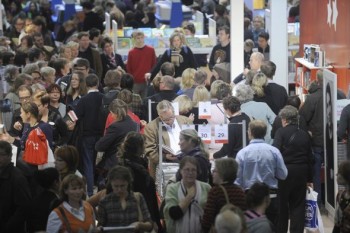Tag: Literary events
And cool it was
30 October 2014 | This 'n' that
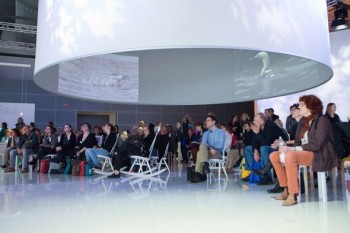
Guests welcome: Finnish pavilion, Frankfurt Book Fair. Photo: Katja Maria Nyman
Finland was Finnland and cool as Guest of Honour at the Frankfurt Book Fair from 8 to 12 October.
There was plenty to choose from, and then some: more than 500 Finland-related events, readings, exhibitions and cultural projects, 50+ Finnish authors, books, pictures, videos, music.
More than 130 books (plus new editions) have been published in German this year, and interest in Finnish literature in other countries – Frankfurt is the world’s biggest book fair, and publishers from all over the world are represented – will inevitably grow.
So the Finnish organiser, FILI – Finnish Literature Exchange – and its staff has now put their feet up for a moment, as it were, after very successfully tangoing through it all, and are savouring all the wow-factor memories of this big enterprise. After several years of preparation and hectic last months, it seems international interest in literary things Finnish exceeded all expectations.
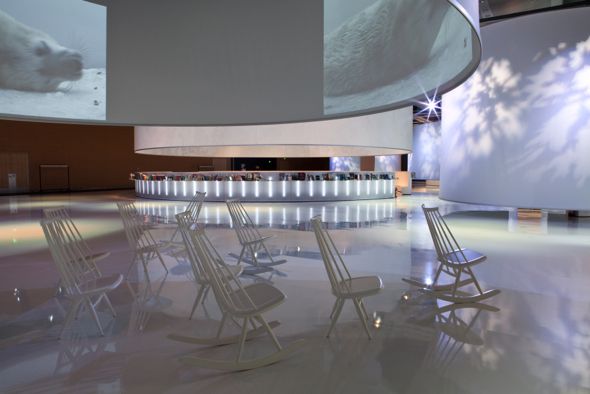
Ready to begin: Finnish Pavilion, Frankfurt Book Fair. Photo: Katja Maria Nyman
For those of you who couldn’t make it to the Finnish Pavilion, there are photographs of various events at Frankfurt, and lots more on this site, so take a look. Vorwärts! / Onwards!
Finland, cool! The Frankfurt Book Fair 8–12 October
30 September 2014 | Articles, Non-fiction

Finnland. Cool. pavilion in Frankfurt, designed by Natalia Baczynska Kimberley, Nina Kosonen and Matti Mikkilä from Aalto University
It starts next week: Finland is Guest of Honour at the Book Fair in the German and global city of Frankfurt. This link will take you to it all.
Approximately 170,000 professionals from the literary world are expected to visit the exhibition halls from Wednesday to Friday; the weekend is reserved for the general public, c.100,000 visitors. Since 1980s different countries have been in focus each year. More…
Cool, not ice-cool
17 October 2013 | This 'n' that

Getting ready: book fair scenery, 2013. Photo: FILI
The Finnish book world is preparing for the big event of ‘F14’: Finland will appear as Guest of Honour at the Frankfurt Book Fair in October next year.
The slogan for this enterprise is Finnland. Cool.
The coordinating organ is FILI, the Finnish Literature Exchange, a part of the Finnish Literature Society. Co-operating with FILI are three ministries, literary organisations and publishers, the Finnish Embassy and Finnland-Institut in Berlin and the Goethe-Institut in Helsinki.
Last week a large proportion of the FILI staff – who now need to keep their cool for the next busy year – went to Frankfurt, and on 10 October (aptly, the memorial day of the national author Aleksis Kivi and also Finnish Literature Day) the press conference was opened by the Finnish Minister of Culture and Sport, Paavo Arhinmäki. On 13 October the 2013 Guest of Honour, Brazil, passed the baton to Finland. (More photographs here.)
The world’s largest book fair, Frankfurt, attracts some 300,000 visitors each year. Accessible to both professionals and the general public, the fair is also the biggest cultural event in Germany.
The Guest of Honour countries receive a vast amount of attention in the media, and the number of new translations from the respective languages into German, as well as other languages, will increase.
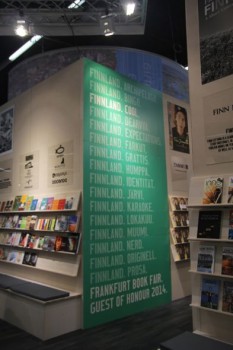
Finnland: arktik. Blondi. Cool. Demokratia. Einsam. Formula 1. Girji. Heimat. Ihminen. Joy…. Photo: FILI
The total Finnish budget for the years 2010–2015 is approximately four million euros, half of it money from the government. And the mission? Here are some warm words from the cool FILI agenda:
‘Why are Finns reading so much? Why are Finns so good at reading? Because we love it. Because reading plays such an important role in everyday life.
‘And because it is so important in Finland that everybody has access to reading – regardless of whether you are male or female, where you live, where you work, what your education or talent is. Fun, everyday life and for everyone – these are the main themes of the satellite programme for the Guest of Honour at the Frankfurt Book Fair 2014.’
Night of the Living….
5 September 2013 | In the news
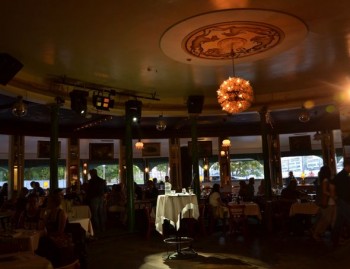
Poetry in focus: Kaisaniemi Restaurant, Helsinki, 24 August. Photo: Irene Dimitropoulos
…Poets was the main event of the annual literature festival Runokuu, Poetry Moon, taking place on 24 August in a Helsinki restaurant. The theme was the sea: the invited guests were from around the Baltic Sea – as well as beyond.
The Poetry Moon festival is organised by Nuoren Voiman Liitto and Helsinki Festival, now for the ninth time, with more than 30 events taking place in the city between 22 and 28 August.
‘In four hours writers and languages kept changing fast,’ reports Irene Dimitropoulos, an intern at FILI (Finnish Literature Exchange): ‘You had to throw yourself into the rhythms and sounds of languages both familiar and strange.
‘The programme contained lots of poetry, but the short story and non-fiction were also included. The idea of the literary evenings is to meet with writers from abroad and also to support translated foreign poetry, as very little gets translated into Finnish, so translators perform with poets.
‘The stylistic and thematic variations of different generations of writers were introduced in many ways. A translation of I Am Going to Clone Myself Then Kill the Clone and Eat It [2009/2012] by the American poet Sam Pink was published in Finnish earlier this year: his style, both simple and strikingly comical, and the way he depicts everyday experiences and the violent fantasies they invoke, made the audience laugh. Crowds were also drawn to listen to the Finnish novelist Monika Fagerholm and the German poet and translator Ulrike Draesner; Fagerholm read from her book of lyrical essays on the sea, Draesner her poems dealing with womanhood and the interaction between language and body.’
Among the other poets were Peeter Sauter and Maarja Kangro from Estonia, Igor Belov and Irina Maksimova from Russia and Toh Hsien Min from Singapore.
Writes of passage
20 June 2013 | This 'n' that
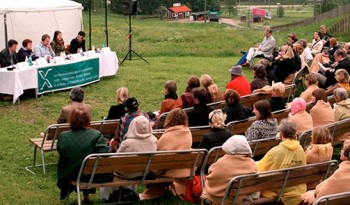
Debating the word: participants at the Lahti Reunion. Photo: LIWRE
The 26th Lahti International Writers’ Reunion took place at Messilä Manor (some 120 km from Helsinki, on Lake Vesijärvi) from 15 to 18 June.
Chaired by Virpi Hämeen-Anttila and Joni Pyysalo, writers from more than 20 countries held discussions in Finnish, English and French.
This summer the theme was ‘Breaking walls’. ‘Problems demand answers, answers demand questions. If attitudes harden, arms talk, and everyone erects a wall around himself, where is literature in the equation? Is the highest wall right there inside the writer? Or is literature itself a protecting wall? What happens when walls break down?’
The first Writers’ Reunion took place in Lahti – first at Mukkula Manor – fifty years ago; more than a thousand writers, translators, critics and other professionals both Finnish and foreign have come to Lahti to discuss writing. The Reunion has always been open to the public as well.
The biannual Reunion began life in 1963, during the Cold War. Writers from both sides of the Iron Curtain met under the oaks of Mukkula. In the Reunion’s blog some participants and organisers share their experiences of the past; here, the meeting’s one-time international secretary Marianne Bargum recalls the late 1970s and early 1980s:
‘…following in the footsteps of the legendary publisher Erkki Reenpää who knew everybody and all languages, I did my best to persuade big stars to come to Mukkula. Some writers had difficulties when they realised that they were not as well known in Finland as in their own countries. The French poet Michel Deguy left after one day, very offended when nobody knew how big a name he was. (I met him in Paris some years later and he apologised.)
A scandal with huge political consequences came close when the French philosopher Bernard-Henry Lévy said some derogatory things about the Soviet head of state Brezhnev. The Russian delegate, Michael Baryshev, threatened to leave the conference, and Valentina Morozova, interpreter and politruk, had to phone the Soviet Embassy in Helsinki and explain that this was not very serious. The famous British critic and writer Al Alvarez did his best to calm down the antagonists in a panel.’
My own first personal experiences of this international fête (which could mean either wading in the mud on the way to the huge tent sheltering the discussions or basking in hot sunshine followed by the most gentle nightless nights), from the sunny summer of 1983: interviewing Salman Rushdie and Jayne Anne Phillips, among others, for the Finnish Broadcasting Company. Another time the bag containing some hundred copies of the latest issue of Books from Finland, fresh from the printing press, sat on a bus heading for Lahti while I sat on the one behind – which then broke down in the middle of the road, and this was before mobile phones. The driver did have a radio phone though, and the participants got their copies in time.

Soccer on the sand: Messilä beach. Photo: LIWRE
Among the traditions is a midnight football match between Finns and foreigners: the summer night is light and long. This time the result of the Finland against the rest of the world was convincing 6-3 to Finland.
Books and roses
23 April 2013 | In the news
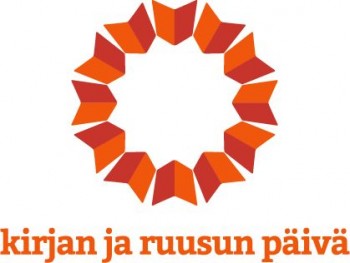 The tradition of the international Day of the Book and the Rose derives from 1920s Barcelona, where the tradition was for men to give women roses while women gave men books.
The tradition of the international Day of the Book and the Rose derives from 1920s Barcelona, where the tradition was for men to give women roses while women gave men books.
23 April is the day – and it is (possibly) also Shakespeare’s birthday. In 1995 UNESCO proclaimed it is the World Book and Copyright Day.
(Actually, we’ve always thought the idea of what is exchanged is rather silly. As women, we would much rather be given a a book than a withering cut flower. On the other hand though, a rose is a safe bet….)
Last year, the Finnish booksellers decided to celebrate the occasion by publishing a new novel which was given for free to all customers who made a purchase worth €10. This was the only way to get hold of a copy; the print run was 3,000 copies. The author was Tuomas Kyrö, the novel, Miniä (‘Daughter-in-law’).
This year the print run is more than tenfold, and the author is Jari Tervo. His novel Jarrusukka (‘Slipper sock’) tells the story of a teacher, working in an immigrant neighbourhood, who finds out it’s not possible to lease a baby in a short term.
Writers breaking walls
19 April 2013 | In the news
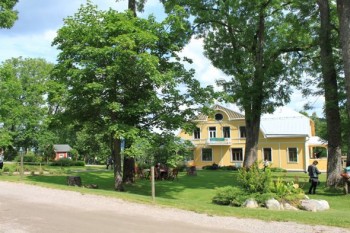
Meeting place for writers: Messilä Manor, Lahti. Photo: LIWRE
The theme of the next biannual International Writers’ Reunion (LIWRE), which takes place in Lahti, southern Finland, will be ‘Breaking walls’.
‘The writer always examines his own limits and boundaries, creates a new version not only of reality but of himself. He addresses, touches and jolts, awakens his readers to see alternative worlds and accept otherness. But is the writer an engine of change, or the eternal stranger?
‘Problems demand answers, answers demand questions. If attitudes harden, arms talk, and everyone erects a wall around himself, where is literature in the equation? Is the highest wall right there inside the writer? Or is literature itself a protecting wall? What happens, when walls break down?’
The 26th Reunion will take place at the Messilä Manor in Lahti 16–18 June. Among the participants – 24 foreign writers so far – will be the Havanna-born Abilio Estévez, Davide Enian from Sicily, Anna Szabo from Hungary and the Dutch-Finnish Kira Wuck.
The chairperson, author and researcher Virpi Hämeen-Anttila, who together with Jarmo Papinniemi (who died last autumn) has chaired the discussions at three Reunions, will now be partnered by writer and journalist Joni Pyysalo.
Finnish comics go to France
24 January 2013 | In the news
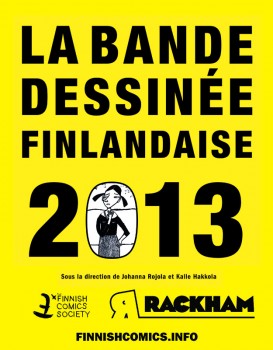 The first anthology of Finnish comics in French will be introduced to a French (and international) audience on 1 February at the biggest European comics festival, which takes place in Angoulême, France.
The first anthology of Finnish comics in French will be introduced to a French (and international) audience on 1 February at the biggest European comics festival, which takes place in Angoulême, France.
La Bande dessinée Finlandaise 2013 (published by the Finnish Comics Society and the French publisher Rackham), edited by Johanna Rojola and Kalle Hakkola, features the work of thirteen Finnish female comics artists. Finland is an exception in the comics scene, because a large proportion of the artists in this field are female.
The Finnish participants in Angoulême are FILI (the Finnish Literature Exchange) and the Finnish Comics Society.
Literary glory and basketball
23 November 2012 | This 'n' that
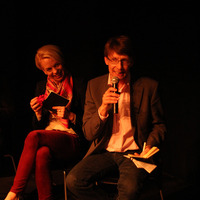
Fights with words: Baba Lybeck and Markus Nummi. Photo: Literary Death Match
Fans of new writing and competitive reading out loud converged on Korjaamo in Helsinki on October 25th for the second Finnish ‘episode’ of Literary Death Match. LDM (as it’s known to regulars) is a series of events created in the USA and hosted by Adrian Todd Zuniga in which authors perform live readings of their recent work and receive critical assessments from a panel of judges in a manner familiar to viewers of trashy TV talent shows.
The winners of the evening’s initial reading rounds advance to the final, where the ultimate victor is decided in a game show-style battle involving skills that are perhaps more tangential to the work of most authors.
In his shiny jacket, LDM co-founder Adrian Todd Zuniga certainly looked the part of the cheesy game show host. He was an enthusiastic compère and got the bilingual evening under way by introducing the panel of judges. Author Markus Nummi was to be responsible for assessing the competitors on literary merit, while Baba Lybeck, a radio journalist and host of Uutisvuoto (the Finnish TV version of the BBC’s topical panel show Have I Got News for You), would be awarding points for performance. The third member of the panel was journalist and author Ari Lahdenmäki, who was assigned the category of ‘Intangibles’, i.e. anything that didn’t fall under the other two headings. More…
And the winner is…?
27 March 2012 | This 'n' that
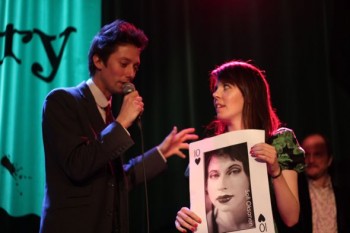
Playing your cards right: Todd Zuniga talks to Riikka Pulkkinen on 20 March in Helsinki. Photo: courtesy/T. Zuniga
The writer Johanna Sinisalo’s words lash the stage like the tail of Pessi the troll in her best-known novel. The novelist Riikka Pulkkinen bursts into deconstructive dance. The singer Anni Mattila translates the poet Teemu Manninen’s explosive poetic frolics into rhythmic dictations and the Finlandia Prize-winning author Rosa Liksom’s conductor’s glittering moustaches see the audience off on a train journey to Moscow.
On a March evening, a Literary Death Match has begun in the Korjaamo Culture Factory in Helsinki’s old tramsheds. The creation of the American author and journalist Todd Zuniga, the Literary Death Match combines an evening of readings with stand-up comedy as well as the judging familiar from reality TV shows.
‘It all started with me eating sushi with two of my friends and talking about some of the readings we’d been to. We all loved literature and loved to listen to writers reading from their own work. But the audience was always the same circle of people. We wanted to expand it beyond literary circles,’ Zuniga explains. More…
Writers’ talk
13 May 2011 | In the news
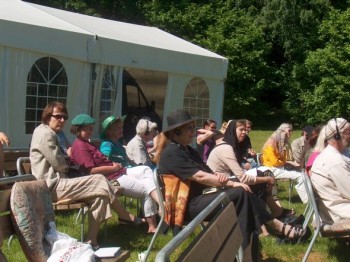
Under the midday sun: participants of the Writers' Reunion in 2005
Next month sees a new International Writers’ Reunion at Messilä Manor in the city of Lahti in central Finland. The first such meeting was organised in 1963.
Since then, more than a thousand writers, translators, journalists, critics and other book people, Finnish and foreign, have met for a few days every other year just before Midsummer to discuss various topics.
And the nights are light, and long, and the talking goes on.
This time the theme is ‘The writer beyond words’: how will the writer meet the limits of language and narration? (More on the topic in our article Beyond words.) The meeting takes place between 19 and 21 June.
So far about twenty writers, from Canada, Czech Republic, Denmark, Estonia, France, Germany, Great Britain, Ireland, Lithuania, Norway, Russia, Slovenia, Sweden and Udmurtia, are expected to arrive, as are some 20 Finnish participants. All debates and poetry evenings are open to the general public free of charge.
Springtime in Paris: Nordic writers on a French visit
25 March 2011 | In the news
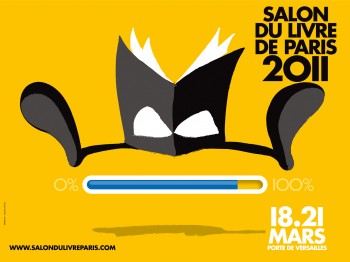 With an icy northerly wind at my back I took off from Helsinki and landed in Paris, where it was springtime and the cherry trees were in bloom. The aim of my trip was to join eleven translators from Finnish into all the main Nordic languages in examining the trickiest corners of the Finnish language and discussing the actual working conditions of literary translators, as well as the possibilities for Nordic literature to assert itself in the world.
With an icy northerly wind at my back I took off from Helsinki and landed in Paris, where it was springtime and the cherry trees were in bloom. The aim of my trip was to join eleven translators from Finnish into all the main Nordic languages in examining the trickiest corners of the Finnish language and discussing the actual working conditions of literary translators, as well as the possibilities for Nordic literature to assert itself in the world.
I was also going to meet with and listen to more than sixty writers from all the Nordic countries. Why did I have to go to Paris to do it? Because this was where Bokskogen, the Forest of Books, had grown.
At the Salon du Livre held in Paris from 18 to 21 March, at which the Nordic countries were the guests of honour, FILI (the Finnish Literature Exchange) was in charge of coordinating the Nordic pavilion, some 400 square metres in area.
The airy Scandinavian Forest of Books was filled with the murmur of Parisians in search of something Nordic to read and intent on having their newly purchased books signed by authors like Sofi Oksanen, Kari Hotakainen, Matti Rönkä, Monika Fagerholm, Katarina Gäddnäs, Seita Parkkola, Aira Savisaari, Johanna Sinisalo, Aino Havukainen and Sami Toivonen.
Before the official inauguration by France’s Minister of Culture Frédéric Mittérand the programmes had already been underway for four days. Just over a hundred professional people – publishers, translators and other cultural figures and institutions from across the Nordic countries – took part in various workshops to discuss common focal points and share experiences and best practices with each other and their French colleagues.
One of the major events was the Cultural Forum, a collaboration between FILI, the Nordic Council of Ministers and the Finnish presidency of the Nordic Council of Ministers. Its theme was the training of translators, and also the book industry in a global context.
In early March a dozen French journalists and booksellers toured Helsinki and Tammisaari (Ekenäs) in order to meet Finnish authors and interview them as a prelude to the big show. As a result Nordic literature also made its presence felt in France’s press and bookstores.
Translated by David McDuff
Beyond words
15 December 2010 | This 'n' that

Meeting place of the Lahti International Writers' Reunion: Messilä Manor
‘Whereof one cannot speak, thereof one must remain silent.’
This famous quotation from the Austrian philosopher Ludwig Wittgenstein has been adapted by the organisers of the Lahti International Writers’ Reunion (LIWRE): the theme of the 2011 Reunion, which takes place in June, will be ‘The writer beyond words’.
‘Whereof one cannot speak, thereof one must write.’ How will the writer meet the limits of language and narration?
‘There are things that will not let themselves be named, things that language can not reach. Our senses give us information that is not tied to language – how can it be translated into writing? And how is the writer going to describe horrors beyond understanding or ecstasy that escapes words? How can one put into words hidden memories, dreams and fantasies that lie suppressed in one’s mind? Does the writer fill holes in reality or make holes in something we only think is reality?
‘Besides literature, there are other forms of interpreting the world; can the writer step into their realms to find new ways of saying things? The surrounding social sphere may put its own limits to writing. What kind of language can a writer use in a world of censorship and stolen words? How does the writer relate to taboos, those dimensions of sexuality, death or holiness that the surrounding world would not want to see described at all? Is it the duty of literature to go everywhere and reveal everything, or is the writer a guardian of silence who does not reveal but protects secrets and everything that lies beyond language?’
The first Writers’ Reunion took place in Lahti at Mukkula Manor in 1963; since then, more than a thousand writers, translators, critics and other book people, both Finnish and foreign, have come to Mukkula to discuss various topics.
In 2009 the theme was ‘In other words’, which inspired the participants to talk about the power of the written word in strictly controlled regimes, about fiction that retells human history and about the differences between the language of men and women, among other things. See our report from the 2009 Reunion; eleven presentations are available in English, too.
Helsinki Book Fair: 28–31 October
22 October 2010 | In the news
The tenth Helsinki Book Fair takes place in Helsinki’s Exhibition & Convention Centre over the last weekend of October. More than 1,000 writers, artists, scientists, politicians and specialists will participate in the programme. There are more than fifty authors from 17 countries, among them the British historian Antony Beevor, the Estonian writer Jaan Kaplinski and the Indian writer Kishwar Desai.
The theme country this year is France, and among the French guests will be the novelists Andreï Makine and Nicolas Fargues, the fantasy writer Pierre Pével and the poets Sophie Loizeau, Hélène Sanguinetti and Gabriel Mwènè Okoundji, originally from Congo.
The translator Anne Colin du Terrail will talk to the writers Leena Lehtolainen and Johanna Sinisalo whose work she has translated into French.
Comics and graphic novels as well as poetry are also in the focus at this year’s Book Fair: approximately 70 Finnish and foreign poets feature in readings, interviews and nonstop performances.
In 2009 a record-breaking number of visitors – almost 77,000 – attended the Book Fair. It seems the autumnal Fair is a handy chance to many to buy Christmas presents, among other things; at least last year three out of four said they had come to buy books (and not just spot celebrities, for example).
This time, in addition to books, the visitors to the Exhibition & Convention Centre will be able to attend two other Fairs, entitled Wine, Food and Good Living and Music Fair as well.
Fair assessment
7 November 2009 | This 'n' that
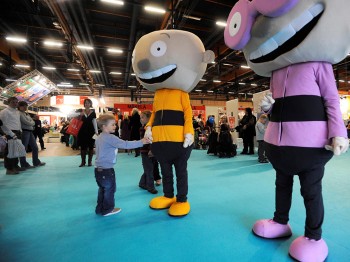
Hello Tatu – or is it Patu?: heroes from the popular children's books by Aino Havukainen and Sami Toivonen meet a fan. – Photo: Suomen Messut
A thousand people more than last year – a record total of 76,800 – attended the Helsinki Book Fair in late October. This year the event was particularly popular with families with children.
More than half of the visitors said they were interested primarily in writer guests, of whom the most popular were, not surprisingly, crime writers, among them Karin Slaughter from the US and Jens Lapidus from Sweden.
Two other fairs, entitled the Wine, Food and the Good Living and the Helsinki Music Fair, were held at the same time at the Helsinki Fairs Centre.
The theme country in 2010 – when the Book Fair celebrates its tenth anniversary – will be France.

